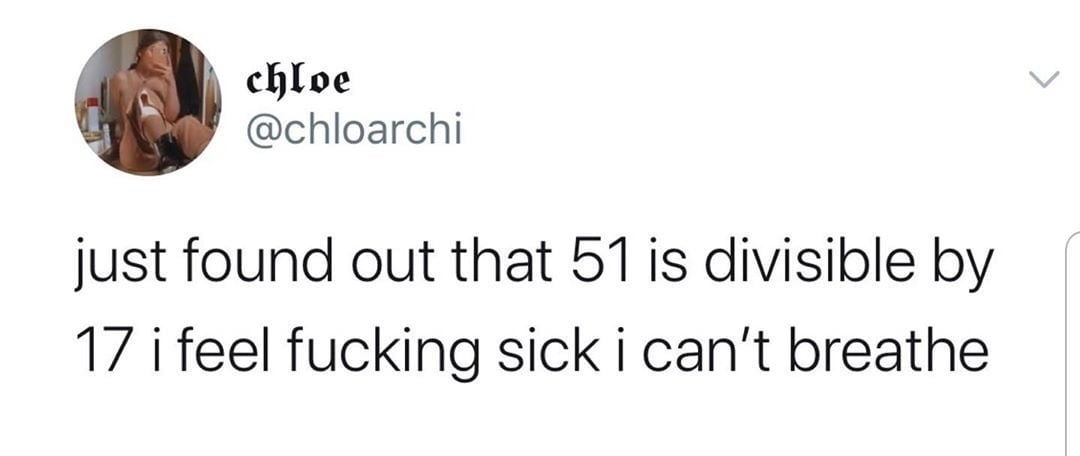51 has to be the non-prime number that feels the most prime
For me it’s Grothendieck's prime.
Well, on the surface, it's just 60-3, so clearly divisible by 3 itself. Now 221, that's some fuckery.
When I was young I learned that when you add up all the numbers if that number is a multiple of 3 than the original number is also divisible by 3. So 51, 5+1=6 and 6 divisible by 3 and so must 51.
Dammit, it was right in the post, why did that take me so long?
Plz don't groth on my dieck, that's just rude.
Grothendieck's Prime tripped me up in a maths competition in high school. i had manually stored a list of primes in my calculator, and one of the puzzles involved primes and deducing the combination to a lock from certain clues. my list of primes erroneously included 57, which almost made my team fail the level, until i realized my error.
All the magic goes when you understand it's 30+21
I always thought it's 31+20
Why? 19 is 15+4 but is still prime?
Because 30 and 21 are both divisible by the same number, 3.
Exactly 3(10+7)
51 --> 5+1 = 6, 6 is divisible by 3. This means that 51 is divisible by 3.
60 is divisible by 3, 60/3 = 20.
51 is 9 less than 60. 9 is divisible by 3. 9/3 = 3.
20 - 3 = 17.
Only way I managed it to make sense is:
17 is 10 and 7
10 * 3 = 30
7 * 3 = 21
30 + 21 = 51
Phuu air. I can breath again. Don't do this to me.
This is how I see it, 30 + 21, doesn’t come up that often obviously, but also we don’t have to love every composite number. In fact, we hates most of them. Add 51 to the pile.
Is this a real divisibility rule?
Yep. If the sun of the numbers is divisible by 3, the number is divisible by three.
Works great for 6 too, as if it's divisible by 3 and even, the number is divisible by 6.
And 9 is the same thing, but the sum has to be divisible by 9 (e.g. 12384 is divisible by 9 because the sum of the digits is 18, which is divisible by 9)
There's also good rules for 4 and 8 as well. If the last 2 digits are divisible by 4, the whole number is (e.g. 127924 is divisible by 4 because 24 is) and if the last 3 numbers are divisible by 8, the whole number is (e.g. 12709832 is divisible by 8 because 832 is.)
You just casually dropping in that 832 is divisible by 8 makes me feel as if there's a small gap in our abilities to do mental math
832 is 800 + 32
800 is obviously divisible by 8, so it can also be negated like the first few digits. 32 is also divisible by 8.
Now provide the proof
https://brilliant.org/wiki/proof-of-divisibility-rules/
The 7 and 13 rules are pretty cool too.
This is insane stuff. 13 is truly mesmerizing. Although I don't think I'm sharp enough for the proofs. Even the divisibility by 2 proof looks hellish.
Il do it for disability by three and a three digit numbers with the digits a, b and c. The value of that number then is 100a + 10b + c. They concept is the same for nine.
100a + 10b + a mod 3 =
a + b + a
This means that, mod 3, a three digit number is equivalent to the sum of it's digits and therefore preserves disability by 3.
I have discovered a truly marvelous demonstration of this proposition that this comment section is too narrow to contain.
Divisibility by 3 rule is real. If the sum of the digits of a number is divisible by 3, then the number itself is also divisible by 3. Same goes with 9. There’s an 11 rule, but it’s a bit convoluted.
There’s also a rule 34, but it’s super advanced.
Yes :)
Everything is divisible by 17
Only issue is what the result is ;)
Reading the beginning of your comment, I was sure you'd end it with "depends how brave you are".
Oh yeah? Then what's 34 divided by 17, smart guy?
Jesus 42

What blew my mind is this. What is the sum of the infinite series
1, -1, 1, -1, ...
One answer is to look at it like this:
(1 - 1) + (1 - 1) + ... = 0
Another answer is to look at it like this:
1 + (-1 + 1) + (-1 + 1) + ... = 1
But then it gets weirder. What if you add two of the series together like so:
1 + -1 + 1 + -1 + ...
____ 1 + -1 + 1 + ...
(Please ignore the underscores. They're just there because otherwise Lemmy messes up the whitespace.)
All the terms cancel out except that first 1 again. But this time it's the sum of two of these series, which means that the sum of one series is 0.5 and somehow not an integer.
The correct answer is that you're not allowed to add up infinite series like this so that's why you get contradictory results if you try.
You are actually allowed to add up infinite series like this.
Only that the infinite series have to be convergent, or else you get little of value. The series in your example oscillates forever (and the oscillation distance remains constant), therefore it diverges.
Take the infinite series 1 + 0 + 0 + 0 + ... and add it like you did:
1 + 0 + 0 + 0 + 0 + ...
___ 1 + 0 + 0 + 0 + ...
And you just get 1 + 1 + 0 + 0 + 0 + ... which is just 2 * (1 + 0 + 0 + 0 + ...)
There’s a Wikipedia page about this: https://en.wikipedia.org/wiki/Grandi%27s_series
The correct answer is that the sum doesn’t have a value, but it you must assign a value to it, then 0.5 is the most correct value.
First step to find 1 + 2 + 3 + ... = -1/12
"This is called 'maths'. Or 'math' if you're American, as they're only allowed to have one. Due to... I don't know budget cuts or something". — ASHEN, Stuart
Someone’s never played darts, I see.
Or at least not well.
Wait until they find out 68 is also divisible by 17.
That's why you always go for multiples of 6 plus or minus 1 that are not multiples of 5 or 11.
57 / 19 ...
30+21 🙂
memes
Community rules
1. Be civil
No trolling, bigotry or other insulting / annoying behaviour
2. No politics
This is non-politics community. For political memes please go to [email protected]
3. No recent reposts
Check for reposts when posting a meme, you can only repost after 1 month
4. No bots
No bots without the express approval of the mods or the admins
5. No Spam/Ads
No advertisements or spam. This is an instance rule and the only way to live.
A collection of some classic Lemmy memes for your enjoyment
Sister communities
- [email protected] : Star Trek memes, chat and shitposts
- [email protected] : Lemmy Shitposts, anything and everything goes.
- [email protected] : Linux themed memes
- [email protected] : for those who love comic stories.
